In our efforts to bring back the best features of classic rock, Brian’s lead guitar has been our secret weapon. We think that the emotive, virtuoso guitar solo is an important part of rock music that has been neglected for far too long, and we’re trying to fix that. Brian is a bit of a perfectionist, and that can be frustrating when we are paying for studio time by the hour, but his attention to detail really shines through on this album in every note the lead guitar plays. Sharing the studio with him has been a joy, an honor, and a learning experience.
Choosing an electric guitar
 Brian used three electric guitars on this album: a “Slash” Les Paul, an American Stratocaster, and a Mexican Stratocaster.
Brian used three electric guitars on this album: a “Slash” Les Paul, an American Stratocaster, and a Mexican Stratocaster.
The “Slash” Les Paul has a very raw, hot, unforgiving sound. Brian used it for the lead parts on Out of Time, Running Scared, Flight III, and Last Warning (you can hear semi-final versions of those songs from The Grinder’s Tale 3P right now!). I was a bit surprised that we didn’t use the “Slash” Les Paul more, it can sound really mean when you play it right and I was very impressed by it in rehearsal. It turned out, however, that we didn’t want the lead guitar to sound quite so mean and in your face all the time. If we didn’t want a guitar part to cut right through the music and slice open your eardrums, we had to pick a different guitar instead of the “Slash” guitar, because that guitar really demands attention.
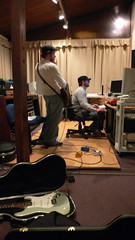 The American Stratocaster is the smoothest-sounding of the three guitars, but it still has a thin, jazzy sound. It is very versatile, you can make a very wide range of different tones depending on which pickups you select or pedals you use. We used it for the lead guitar part on The Grinder’s Tale, Flight II, My Private Asylum, Break Free, and Contained.
The American Stratocaster is the smoothest-sounding of the three guitars, but it still has a thin, jazzy sound. It is very versatile, you can make a very wide range of different tones depending on which pickups you select or pedals you use. We used it for the lead guitar part on The Grinder’s Tale, Flight II, My Private Asylum, Break Free, and Contained.
(If I recall correctly, the picture to the right also features Brian experimenting with his effects pedals in order to get the several layers of feedback right that appear at the very end of Out of Time. We left the door to the amp closet open so that the guitar would feedback, and we played with delay pedals that gave us some rhythmic patterns, as well as producing some bizarre results that reminded me of the Forbidden Planet soundtrack. This was one of the few times we used multiple pedals, as I’ll discuss later.)
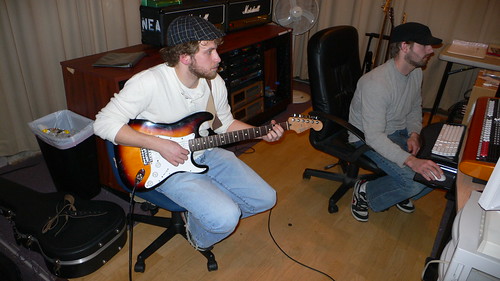
Finally, we used an inexpensive Mexican Stratocaster for rhythm guitar. (We didn’t use it for lead guitar at all.) Brian likes it for rhythm because it has a little bit of a wobbly, unstable sound that gives more flavor to the rhythm parts. We used it for the rhythm on Last Warning, Running Scared, and the electric guitar at the end of Bobby McGee.
Pedals, or lack thereof
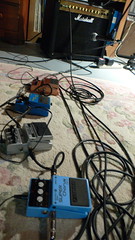 Back in the day when we were in Nuzzo’s basement studio recording our old EP, Brian used to use lots of pedals at once in his pursuit of the ultimate electric guitar sound. The photo to the left shows a typical pedal setup from the Nuzzo sessions. We’ve learned since then that sometimes less is more. If you have a good guitar and a good amp+preamp, and you’ve got a good sound, throwing lots of pedals on top of that will just screw it up. On the “Stay Awake” album, Brian mostly used only one pedal, a distortion pedal. We’re keeping it simple and raw.
Back in the day when we were in Nuzzo’s basement studio recording our old EP, Brian used to use lots of pedals at once in his pursuit of the ultimate electric guitar sound. The photo to the left shows a typical pedal setup from the Nuzzo sessions. We’ve learned since then that sometimes less is more. If you have a good guitar and a good amp+preamp, and you’ve got a good sound, throwing lots of pedals on top of that will just screw it up. On the “Stay Awake” album, Brian mostly used only one pedal, a distortion pedal. We’re keeping it simple and raw.
The “Out of Time” solo
The guitar solo that closes “Out of Time” just might be the crowning moment of awesome for this album. It’s the solo that made me say “we need to get this into Rock Band” (stay tuned for more on that). The interesting thing to me is that the most emotionally powerful part of the solo, the climactic 20 seconds, is the only part that is simple enough for me to play (although Brian plays it much better, of course). Van Halen-esque theatrics are impressive, but sometimes what you need for a great solo is to play just a couple notes very passionately, and I think that’s what Brian did. Which is not to say that Brian doesn’t also have amazing technique.
One technique that Brian used in this solo that I had never seen before is a pinch harmonic or a “squealie”. Pinch harmonics are quite common in heavy metal and ZZ Top songs, all heavy metal solos are full of pinch harmonics, but I don’t listen to heavy metal much. Neither does Brian, I understand, but he learned the technique from his friend Christan who is into heavy metal giutar. To play a pinch harmonic you pluck the string with a pick, and then immediately after you hit it you barely scrape the string with your thumb. Thumb it too hard and you kill the note, thumb it too lightly and it doesn’t have the desired effect. You’ll be able to hear a pinch harmonic in “Out of Time” at around 3:27, it’s the 3rd note that Brian plays after the background vocals come in, and it is an extremely distinctive sound. I can’t wait for you to hear it 🙂
Brian’s interview
N: You’ve just finished a long day of recording electric guitars, how are you feeling?
B: I’m feeling tired, I’ve been tired for a like few hours now. I’m definitely like several hours, um, steps behind where I should be going to sleep…
N: That’s what our band is about, right?
B: Actually yeah, that’s right, I kind of forgot about that part, the whole Wrong Side of Dawn thing… I mean, I would be staying up until morning if that were true.
N: That’s true, thank god we are not there yet.
B: Yeah, I mean, I feel really good with what I recorded, I’m kind of disappointed we didn’t get through every single song today. But that might have been a little overambitious.
N: What was the favorite thing you recorded today?
B: Definitely the ending solo for Out of Time. We spent a lot of time on the feedback afterwards, which actually I think we need to kind of hold back on that with the mixing so that it doesn’t overshadow the song or anything like that. It’s supposed to be that it comes in for 10 seconds and then goes away. The actual solo itself, I was really glad how that went. I basically got it in one take, had to punch in just a couple of parts. I’m really glad I got the “Slash” Les Paul, it worked really well for that solo. I think it sounds really intense, and once we get other things like the vocal harmonies and stuff in there, that’s going to be a good climax to that song. I’ve definitely really been looking forward to that particular one minute of this album, and it’s gone well so far.
N: What was your least favorite thing about today?
B: Definitely Vulture [now called My Private Asylum], it’s weird how pretty much the solos were the easiest thing to record. It’s something like Vulture that doesn’t have any solos that needs to be exactly right. Definitely the solos were, ironically enough, the easiest thing to do, everything else is hard.
N: How do you think the album is coming along?
B: I think it’s coming along really good. I really feel like these songs are better than good. It’s disappointing when I show people what I’m writing and they say it’s good. People always say it’s good, and it really frustrates me. Your 3rd grade class project that you did the night before is good. I really think our songs are better than good…. so I sometimes wonder if I’m like the only real believer in some of these songs, but I think they’re going really well. Better than well.
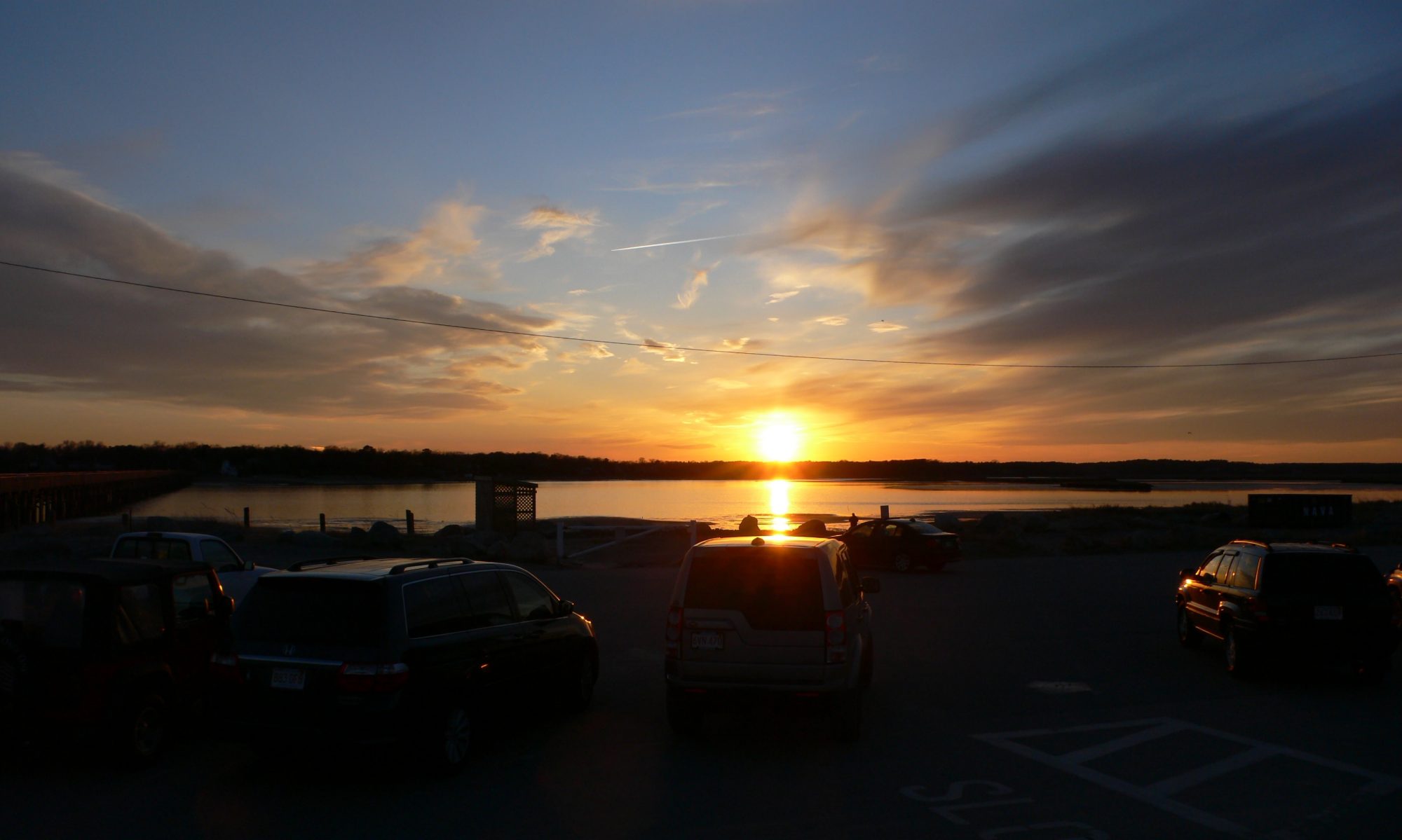
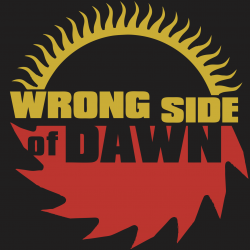
One Reply to “Recording electric guitar with Brian Rose”
Comments are closed.